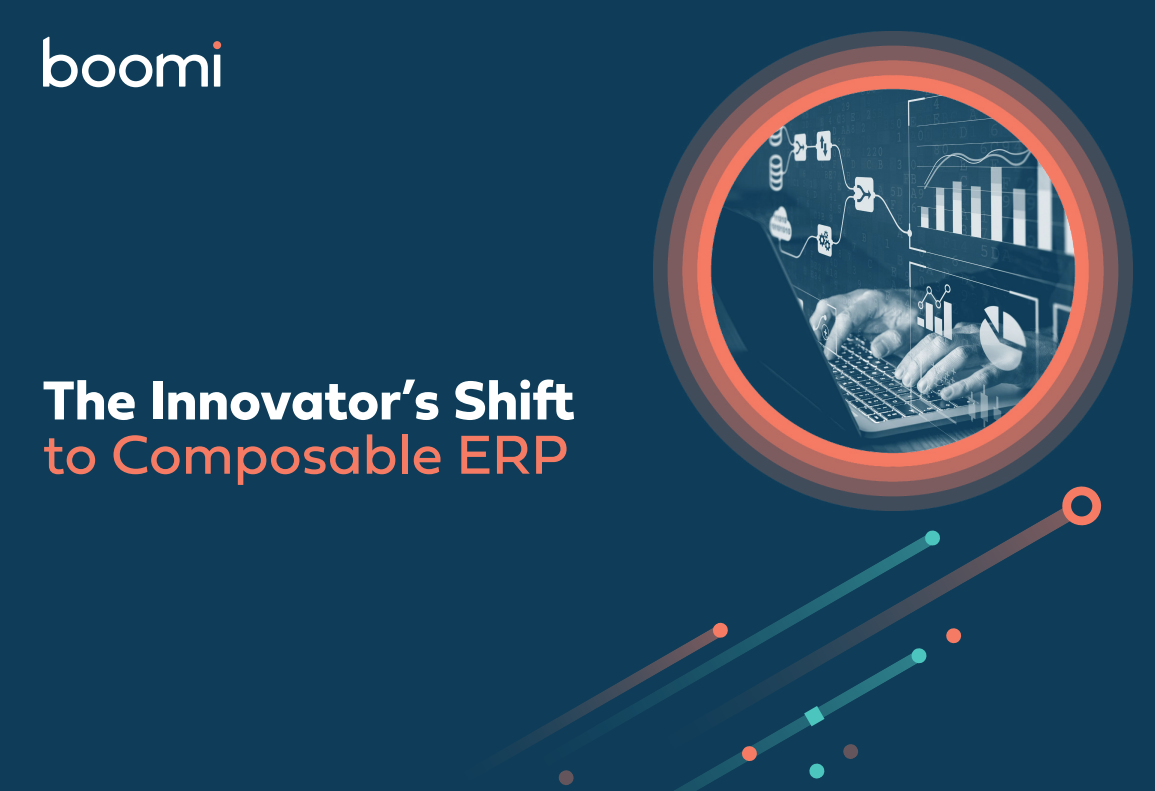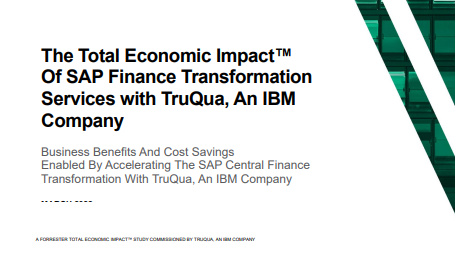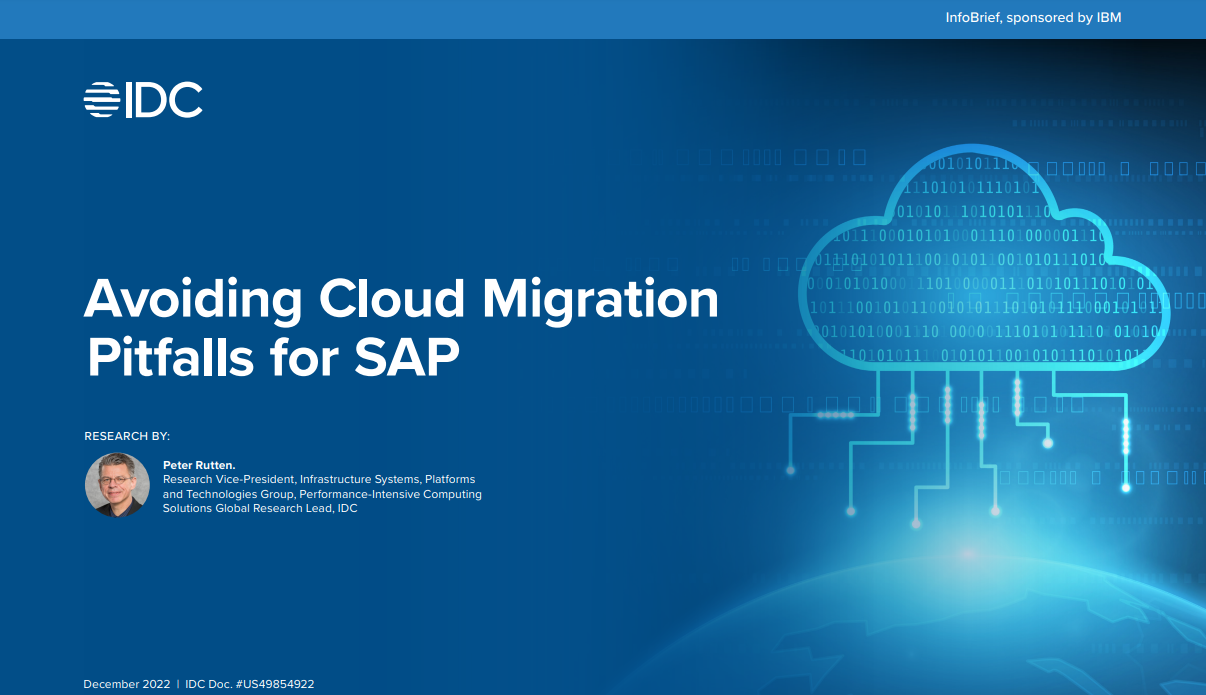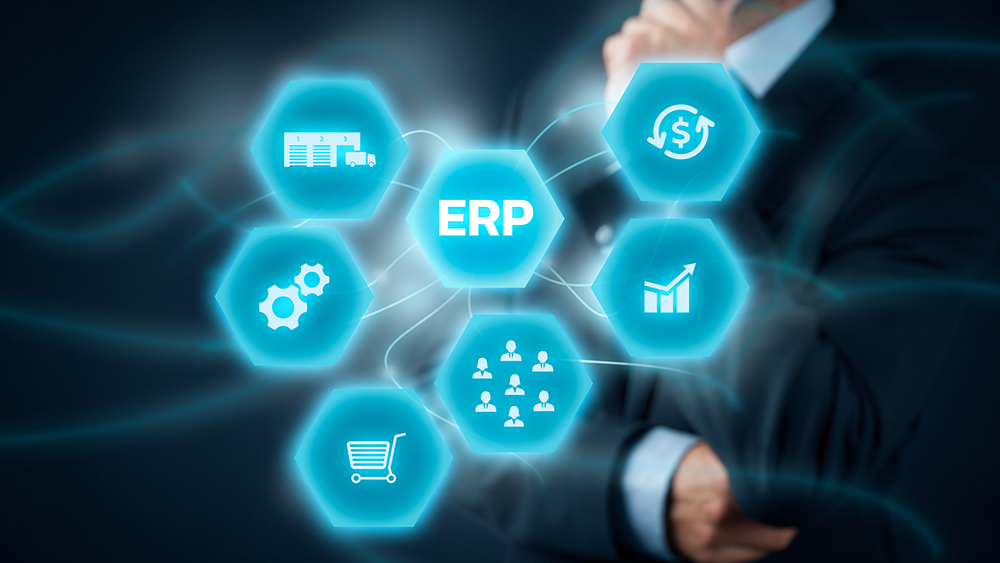What is enterprise resource planning (ERP)?
We explain how enterprise resource planning can benefit your business and how to choose the right software for your organisation

ERP, or enterprise resource planning (ERP) is a type of business management software that enables an organisation to manage all the components of their operation in one place, featuring "modules" that work together to automate processes.
RELATED RESOURCE

The innovator’s shift to composable ERP
How to modernise with as little risk as possible
An ERP system can often be built to suit to a businesses' needs, combining elements such as accounting, human resources, CRM, staff management and more. By automating many of these day-to-day back-office tasks, businesses can become more efficient, with staff freed up to focus on business innovation and growth.
There are countless ERP platforms available some have been developed for specific verticals, while others are more generic, suited to any business type.
Benefits of ERP
What makes ERP such a game-changer is that everything can be managed from a central console, eliminating the need to jump between different tools to manage different tasks.
This also allows collaboration between departments, permitting staff to access the areas they need to carry out their jobs, with the entire business working towards the same goals with minimal intervention required from the IT department.
This central dashboard will also allow stakeholders to get a better overview of the entire business, providing the visibility to make more informed decisions based upon the data across performance, resource distribution and more.
ERP Modules
What makes ERP such an effective tool for businesses is that they can mix and match the modules they need to manage their business, rather than having to buy a huge software ecosystem with features they may never use.
Sign up today and you will receive a free copy of our Future Focus 2025 report - the leading guidance on AI, cybersecurity and other IT challenges as per 700+ senior executives
It means businesses can cut costs, only using the features they need to make their business tick.
For example, if parts of your business operation are managed externally, such as finance or HR, you don't need to add on those modules.
ERP platforms are extremely flexible for this reason and modules can be easily switched and changed as your business does. For example, if you bring HR in house, you can simply tag on the HR module so your new HR staff can use the same system you're already using.
It means that the functionality can be extended, while ensuring everyone in the business has visibility of its operation (at least those who are permitted access to it).
Types of ERP system
There are a vast array of ERP systems available. Some are more suited to a specific sector, while others are more generic and focus on the operation rather than vertical.
If you're unsure which type of ERP system is right for you, we've outlined the benefits of each.
Vertical ERP
Some ERP tools are developed for a specific industry vertical - for example, if you run an engineering firm which has very specific processes and/or equipment, there would be tangible benefits when choosing a system that caters to the need of that sector rather than a generic solution.
Size of business
If you're a large company, it's likely your business will operate in a very different way compared to a small enterprise. For starters, you're likely to have more staff and each person's role will be limited in comparison to a smaller firm, whose employees are more likely to overlap in their day-to-day duties.
Therefore, finding a solution specifically catered to the number of employees you have and their job roles may be the right decision for you.
Platform
ERP tools are available to run both on-premise and in the cloud. Carefully consider which is right for your business. Those based in the cloud are generally more scalable because it's much easier to increase capacity rather compared to on-premise solutions that have limited storage. However, you may require the security of on-premise if your industry is heavily regulated.
Cloud-based options also run on a month-by-month or an annual subscription model, avoiding the upfront costs that come with purchasing a system outright. Over the medium to long term however, the cost-benefit analysis may swing towards on-premise ERP systems.
Compliance
Similarly, if your industry sector is highly regulated, you may need to find an ERP tool that specifically ensures you are complying with regulations and will provide the reports you need to present to an industry body, for example.
ERP tools offer massive advantages to a business, boosting productivity and innovation, but they can also be a big investment. Whilst off-the-shelf ERP systems are usually suitable for small enterprises, it is important to remember that these less expensive choices may not be the most economical. Investing in a system which does not suit your business demands will not only be a waste of capital but will affect processes and efficiency.
Research on the most suitable type of system to match your business needs is vital before making the jump.
The biggest companies in ERP
The biggest providers of EPR solutions are a mixture of technology giants - mainly those that specialise in cloud computing - and stalwarts from the accounting software industry. However, a number of these firms made an entry into the ERP market through strategic acquisitions.
Microsoft
Microsoft has been a market leader for EPR services for almost 20 years and continues to do so today with its Dynamics product suite. Many of its products come from Microsoft's 2001 acquisition of Great Plains Software which developed most of the initial software for services that later became Dynamics.
Oracle
Oracle's ERP services have largely come through a number of acquisitions it made in the early 2000s. The software giant is now a leader in the market with its Oracle Fusion and E-Business Suite product lines. It also brought NetSuite in 2016, which many saw as one of the best cloud-based ERP services, at the time.
Sage
Sage is one of the largest ERP suppliers when it comes to smaller businesses. It does offer services to larger companies, though it has an abundance of small to mid-size business offerings. Many of its services are customisable and also offer the company's accounting expertise.
SAP
German software powerhouse, SAP has been in the ERP game since the early 70s and has today it has over 400,000 global customers. The company caters for all sizes of businesses and offers tools designed to simplify the process and scale up as and when needed.
Epicor
Epicor has some 25 years of ERP experience, largely in the manufacturing, distribution and retail industries. Many of its services provide a modular architecture which can be customised to suit the business needs.
Infor
While not as famous as the other companies on this list, Infor has been at the forefront of cloud computing and ERP for two decades. It has a foothold in a number of different industries, offering its services to nearly 70,000 organisations around the world.
ERP during a crisis
The sweeping changes brought about by 2020’s coronavirus pandemic led to an increased interest in ERP. Thomasnet.com reported that searches for ERP software on its platform increased by 160% year-on-year in Q2 and by 278% compared to Q1.
RELATED RESOURCE

The innovator’s shift to composable ERP
How to modernise with as little risk as possible
The benefits of ERP during times of uncertainty and upheaval should be clear. The flexibility these systems offer, with the ability to scale up and down easily and add new functionality to your ERP platform, can prove invaluable when your business is having to respond to quickly and unpredictably changing circumstances.
An ERP platform could well offer modules that are suddenly imperative to the continued functioning of your business during lockdown or other disruptions, all while ensuring your organisation stays compliant with regulations.
ERP offers a level of access and visibility of your systems that is more valuable than ever in the context of our newly decentralised working practices. In new circumstances where workforces are more scattered and decentralised than ever before, ERP centralisation can ensure efficiency and productivity by giving easy access to vital systems all in one place. The automation they offer can help your business roll with the punches and free you up to focus on sudden changes as they arise.
Whatever unforeseen circumstances your business finds itself in, ERP can offer stability, helping you adapt to those changes and overcome them.
-
 Microsoft unveils Maia 200 accelerator, claiming better performance per dollar than Amazon and Google
Microsoft unveils Maia 200 accelerator, claiming better performance per dollar than Amazon and GoogleNews The launch of Microsoft’s second-generation silicon solidifies its mission to scale AI workloads and directly control more of its infrastructure
-
 Infosys expands Swiss footprint with new Zurich office
Infosys expands Swiss footprint with new Zurich officeNews The firm has relocated its Swiss headquarters to support partners delivering AI-led digital transformation
-
 How Crew Clothing went mobile to turn around a struggling business
How Crew Clothing went mobile to turn around a struggling businessCase Study Mobile sales tech unleashed a tide of change, buoying further growth across the UK coast-inspired casualwear chain
-
 The Total Economic Impact™ of SAP finance transformation services with TruQua
The Total Economic Impact™ of SAP finance transformation services with TruQuaWhitepaper Business benefits and cost savings enabled by accelerating the SAP central finance transformation
-
 Avoiding cloud migration pitfalls for SAP
Avoiding cloud migration pitfalls for SAPWhitepaper Determining the best approach to SAP HANA
-
 What to expect from Oracle CloudWorld 2022
What to expect from Oracle CloudWorld 2022Opinion Larry Ellison and co are heading to Las Vegas for a rebranded cloud-centric show
-
 Microsoft announces Teams chat integration for Dynamics 365
Microsoft announces Teams chat integration for Dynamics 365News The integration offers features to streamline collaboration between teams while aiming to enable the faster closing of sales
-
 Unit4 acquires Scanmarket to bolster ERP suite
Unit4 acquires Scanmarket to bolster ERP suiteNews The acquisition aims to extend Unit4’s transactional procurement functionality and provide more benefits for its customers
-
 ERP transformation timeframes cut from years to weeks
ERP transformation timeframes cut from years to weeksNews Businesses are no longer questioning the value of digitisation, SAP execs say, but the c suite is still holding things back
-
 The innovator’s shift to composable ERP
The innovator’s shift to composable ERPWhitepaper How to modernise with as little risk as possible